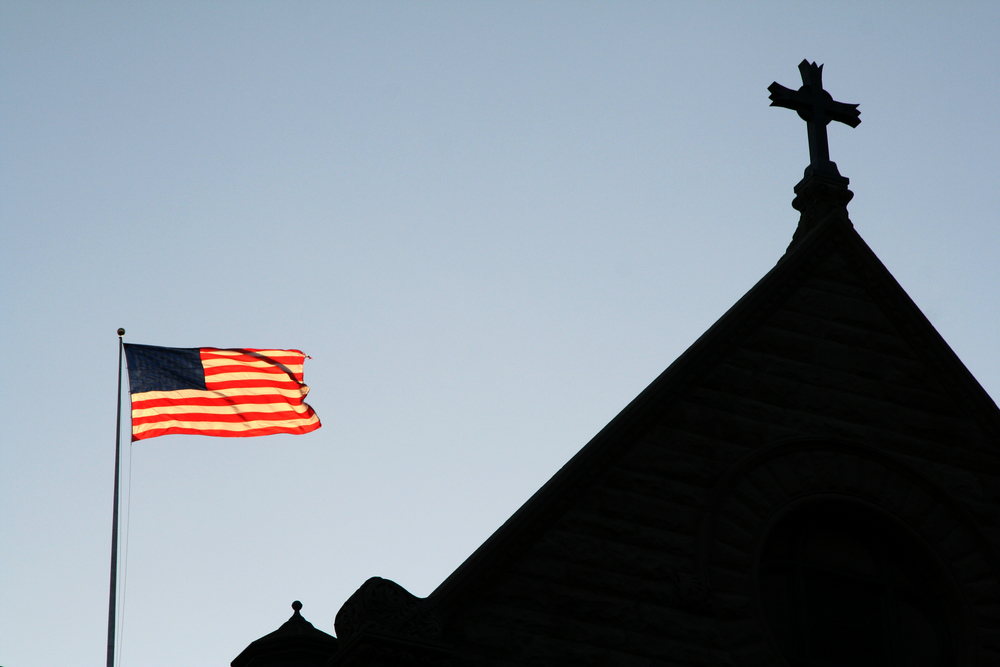Until a few years ago, I was not even familiar with the term “integralism,” which refers to the Catholic political doctrine that calls for the subordination of the state to the church. As a believer from the Islamic tradition and a supporter of classical liberalism, I believed that Christians had rightly sorted out this perennial debate of religion vs. state by separating them—but also making sure that the state protects religious freedom and does not threaten it, which is always a possibility. How the Catholic Church in particular came to embrace liberty for all was an inspiring example relevant to contemporary discussions within Islam.
History, however, is not always linear. Old ideas can come back and challenge some historic accomplishments. Which is exactly what has been happening among American conservatives in recent years with the rise of “post-liberalism,” a movement that rejects the very liberal principles on which the United States is founded: individual liberty, religious freedom, free markets, and the separation of church and state. Especially vocal among these post-liberals are the new integralist thinkers, who are not numerous but nevertheless seem to have gained some traction, partly because their ideas are quite radical (and therefore appear to be “new”) and their advocacy is often quite passionate.
That is why we are indebted to Kevin Vallier for his new book: All the Kingdoms of the World: On Radical Religious Alternatives to Liberalism, which gives a stimulating introduction to the new integralist movement, covering its brief history, scrutinizing its arguments, and cautioning against its ambitions.
As the book’s title indicates, Catholic integralism is not the only doctrine Vallier investigates. That is because, as he notes, there are various “religious anti-liberalisms” in the world today, ascendant in countries like Russia, India, Poland, Hungary, Turkey, and China. They are built on different religious traditions, such as Eastern Orthodoxy, Islam, Hinduism, and Confucianism, but all claim that “society should recognize a single religion as correct.” They also “reject the liberal order with intensity—and total conviction.”
Overthrowing Dignitatis Humanae
Despite its wide range, most of Vallier’s book focuses primarily on the integralists. Vallier “rejects” their doctrine but “does not dismiss” it. In very accessible prose—which is not what you always find in the writings of academics—he shows how this premodern ideal has reemerged slowly in the past few decades among a few Catholic thinkers. A pioneer among them was the British philosopher Thomas Pink, who felt uneasy with the major shift the Catholic Church had taken with the Dignitatis Humanae declaration, which came out of the historic Second Vatican Council (or “Vatican II”) in 1965. This remarkable document has been hailed by many as a crucial endorsement of universal human dignity and freedom. For Pink, however, at least in its common interpretation, “This document discarded the Church’s self-understanding as a polity and embraced a degree of religious liberty that endangered the Church’s mission. If everyone has complete religious freedom, the Church cannot properly discipline and govern its flock.”
So the church has to “govern its flock,” and the liberal ideology that deprived the church of its coercive power has to be defeated. Catholics who have been misled by this ideology must be defeated as well.
Vallier explains that such ideas circulated among a relatively small circle until they gained popularity among some American Catholics in the mid-2010s. Interestingly enough, “many of the young integralists were quite left-wing economically, defending democratic socialism and Bernie Sanders’s candidacy for the US presidency.” Others believed, however, that “Trump had the world-historical power to displace the liberal consensus,” and thus opted for him. This right-wing camp quickly dominated the movement, which gained steam with new, prominent advocates, such as the Harvard law professor Adrian Vermeule, a recent convert to Catholicism.
What do the integralists really want? It’s hard to believe, but in Vallier’s words they are hoping “a new Catholic Christendom can arise from the ashes of doomed American liberalism.” They believe they have a chance because “liberalism is on the brink of collapse” and “they are happy to help it along.” Their goal “is victory, not compromise.”
If they achieve their victory, Vallier explains, they will really govern their “flock.” Non-Christians in society would be mostly allowed to continue their erroneous ways, which may be a relief, but those who are baptized will be disciplined. The integralists “want the state to help enforce canon laws.” That means they will introduce laws against “heresy” and “apostasy.” They will also use various means of “indirect coercion” to “clear away temptations to false and heretical opinions.” Thinking ahead for the integralists themselves and imagining real-life scenarios their ambitions would create, Vallier shows that their ideology would create terribly authoritarian regimes. For example, “Given citizens’ costless communication via the internet, integralist states will have to spend significant resources to surveil the populace. They might adopt a policy like China’s Great Firewall.”
The Contribution of the “Woke Left”
One important observation that Vallier makes is that this new integralist movement emerged partly as a reaction to another illiberal movement: the assertive progressivism that has dominated many American institutions in the recent years. This “woke left,” as it is also called, is so aggressive that it will “not rest until the church ceases to exist,” as Sohrab Ahmari, another Catholic “post-liberal,” believes. “Religious conservatives have been fools for playing by liberal rules,” Ahmari argues. Instead, they “must fight fire with fire.”
While this reaction is understandable, it is plainly wrong for a few reasons. First, there is really nothing good about replacing the tyranny of one group with that of another. Second, there is a tyranny-free ideal, where a neutral and limited government simply protects natural rights, which is what liberalism is all about. (As the U.S. Declaration of Independence declares: “All men … are endowed by their Creator with certain unalienable rights,” and “to secure these rights, governments are instituted among men.”)
Yet integralists deny that such a neutral government is ever possible, which brings us to the third flaw in their thinking: they depict assertive progressivism as nothing but an advanced, and inevitable, stage in liberalism, as argued by Patrick Deneen, who himself is not explicitly an integralist but whose tirades against liberalism have certainly helped the movement.
Vallier, to his credit, notes that this caricature of “liberalism” is just that. First, he shows that some European Catholics have equated liberalism only with “French Revolutionary liberalism,” which is of course a specific historical case that was notoriously illiberal when it came to religion. But even more important is the case of the American “woke left.” Vallier rightly stresses that this movement emerged not out of liberalism but out of the left’s more recent rejection of key liberal doctrines: “free speech, robust religious freedom, and state neutrality.”
Therefore, one could argue, those who want to fight “wokeism” should not fight liberalism. Instead, they should revive it—unless, of course, they are hell-bent on establishing their own kingdom.
Which may well be the case with the integralists. In which case, debating “true liberalism” with them may be a futile exercise. Therefore, I believe, one should scrutinize their idea of “utopia” and envision what it would really look like, which Vallier does skillfully, chapter after chapter.
Is It Good for Religion?
An issue I find particularly important is one integralists themselves don’t seem to be bothered by: Will integralist states, which will impose religion on society, really be good for religion? Will they truly “save souls”?
Vallier hints that the answer may well be “no.” “Integralist arrangements crested in the thirteenth century,” he notes, “but historians doubt that thirteenth-century Western Europeans were especially pious.” He also reminds readers of the wise warning by John Courtney Murray, a pioneer of Catholic liberalism, that coercion may be counterproductive and can “create an apostasy cascade.”
But Adrian Vermeule seems to disagree. In a chilling statement, he argues that religious coercion will in fact work because, once the integralist rulers grab the people by the neck, their hearts will ultimately follow: “Subjects will come to thank the ruler whose legal strictures, possibly experienced at first as coercive, encourage subjects to form more authentic desires for the individual and common goods, better habits, and beliefs that better track and promote communal well-being.”
Could he be right?
Lessons from Islamists
That question takes me to the parallelism Vallier draws between Catholic and Muslim “anti-liberals,” the latter sometimes called “Islamists.”
The short section Vallier has on these Muslim anti-liberals is not comprehensive but still accurate and helpful. As he notes, and as I would stress, what is called “integralism” in the Catholic tradition is quite similar to the premodern Islamic political tradition. For centuries, Muslims lived under states that derived their legitimacy from implementing the Sharia (their “canon law,” so to speak), which was interpreted by religious scholars (their “church,” with some differences). Also, just as in Catholic integralism, Islamic states typically refrained from forcing conversions, allowing Jews and Christians to practice their religions, though with legal limitations, while they used various means of coercion to discipline their own “flock.”
The big difference is that, with Vatican II, liberalism became widely accepted among Catholics. So today’s integralists are trying to revive a bygone era. In Islam, however, besides small pockets of reformist thought, “integralism” is already the normative doctrine. In the past century, there have been secular political experiments, but often in tension with religious doctrine—and often themselves illiberal, compounding the problem. Those who are called “Islamists” are actively trying to reverse these secular experiments, to bring Islam “back to power”—often with a vengeance.
Moreover, Islamists have already been quite successful in countries like Iran, Afghanistan, and Pakistan. In other words, the utopia of the Catholic integralists—a desecularized state—has already been put into practice by Ayatollah Khomeini, the Taliban, and the Pakistani Islamists, who have succeeded in “Islamizing” their laws. And the result has been terrible for human rights, dignity, peace, and prosperity.
Furthermore, the results have been pretty bad for religion itself. This is most evident in Iran, as more than four decades of “Islamic” rule have made Iranian society not more religious but rather less, as many observations and various polls have shown—and as I have written elsewhere. As Islam merged with a brutally authoritarian regime, citizens who detested that regime began to renounce Islam, too. Ultimately Iran became the number one Muslim‐majority country in producing apostates from Islam, often into atheism or Christianity.
In other words, Vermeule’s prediction that “subjects will come to thank the ruler” for religious coercion has been tested in Iran—and has been proven false.
Of course, integralists can say, “But that was the wrong religion.” Islamists themselves keep saying, “But that was the wrong version of the true religion.” Just as with socialism, every failed experiment with the ideology may lead to a stronger conviction that it has never truly been tried—so it must be tried again and again.
Yet there is enough evidence, past and present, to conclude that advancing religion with the coercive power of the state is a bad idea. And whenever that idea is reintroduced, those who take their religion seriously while also valuing liberty must offer pointed critiques. Which is exactly what Vallier offers in All the Kingdoms of the World, a work that deserves to be read, discussed, and pondered.

